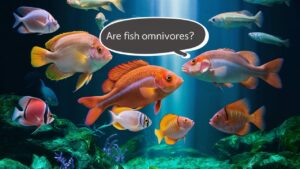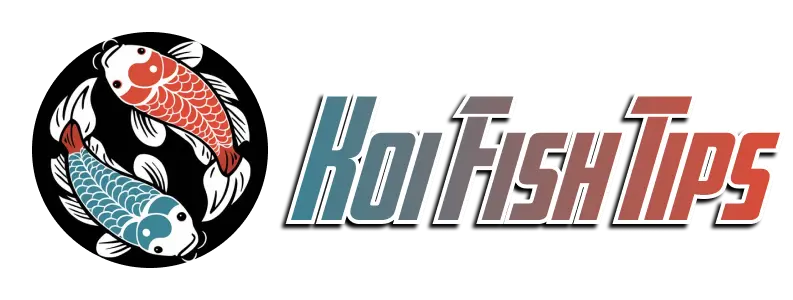Koi Fish Tips is here to explore the fascinating world of fish diets, focusing on the question: Are fish omnivores? We’ll uncover the different types of fish diets, explore the reasons behind their eating habits, and provide insights into the nutritional needs of these fascinating aquatic creatures.
Are Fish Omnivores?
While some fish are omnivores, it’s not a universal characteristic. Here’s a breakdown:
Herbivores: The Plant-Eaters
Some fish species are strictly herbivores, meaning they rely solely on plants for their food. These fish have adapted to digest plant matter efficiently, often possessing specialized digestive systems and teeth. Examples of herbivorous fish include:
- Grass Carp: These fish are known for their voracious appetite for aquatic plants and are often used to control algae growth in ponds.
- Silver Dollar: These fish primarily feed on algae, plants, and fruits.
- Angelfish: While they may occasionally nibble on small invertebrates, their diet mainly consists of algae and plant matter.
Carnivores: The Meat-Eaters
Carnivorous fish are predators that primarily feed on other animals. Their teeth are sharp and pointed, designed for catching, tearing, and consuming prey. Some examples of carnivorous fish include:
- Barracuda: These fast and aggressive predators hunt down smaller fish and squid.
- Pike: These ambush predators have sharp teeth and powerful jaws for catching prey.
- Shark: These apex predators are known for their diverse diets, including fish, seals, and even larger prey.
Omnivores: The All-Rounders
Omnivorous fish are the most versatile eaters, consuming both plants and animals. These fish have adapted to take advantage of a wide range of food sources, making them adaptable to different environments. Some examples of omnivorous fish include:
- Goldfish: These popular aquarium fish are known to eat a variety of foods, including flakes, pellets, algae, and small invertebrates.
- Koi: These colorful fish are also omnivores, consuming a mix of plants, insects, and commercially prepared foods.
- Tilapia: These fish are known for their ability to thrive in various environments and consume a wide range of food sources, including algae, insects, and small fish.

Why Do Fish Have Different Diets?
The variety of diets among fish is a fascinating result of evolution. Here’s a breakdown of the key factors that drive this diversity:
Habita
- Plant-rich environments: Fish living in areas abundant with aquatic plants are more likely to be herbivores or omnivores. They have developed adaptations to efficiently consume and digest plant matter.
- Open water: Fish inhabiting open water environments often have more carnivorous diets, as they rely on hunting other fish and invertebrates.
Prey Availability
- Carnivorous specialization: Fish have evolved to specialize in hunting the prey most abundant in their habitats. This can lead to unique adaptations, such as sharp teeth for catching fish or powerful jaws for crushing shellfish.
Competition
- Resource partitioning: Different fish species have evolved to specialize in different food sources to minimize competition. This ensures that each species has access to enough food to survive and reproduce.
The Importance of a Balanced Diet for Fish
Just like us humans, fish need a balanced diet to stay healthy and happy! A balanced diet provides all the essential nutrients they need to grow, thrive, and reproduce. Here’s a breakdown of the key components:
Proteins
- Building blocks: Proteins are essential for muscle growth and development. Fish need a steady supply of protein to build strong bodies and swim efficiently.
Fats
- Energy and cell function: Fats provide crucial energy for fish and support vital cell functions. They also help with insulation and hormone production.
Vitamins and Minerals
- Overall health: Vitamins and minerals are essential for a fish’s overall health and well-being. They play crucial roles in immune function, bone development, and many other vital processes.
A balanced diet ensures that fish receive the right amount of each nutrient, promoting their overall health and longevity. Just like we choose our food carefully, it’s important to provide fish with a varied and nutritious diet to support their needs.
Can I change my fish’s diet?
It’s generally not recommended to drastically change a fish’s diet suddenly. Here’s why:
Digestive System: Fish have adapted to specific diets, and their digestive systems are designed to process certain types of food efficiently. Sudden changes can cause digestive upset, bloating, and other health problems.
Nutritional Needs: Different fish species have specific nutritional needs. A diet that is suitable for one species may not be adequate for another.
Habits: Fish can develop strong food preferences and may be reluctant to try new foods. Introducing new foods gradually can help them adjust.
Here’s a safer approach:
Gradual Introduction: If you want to change your fish’s diet, start by gradually introducing new foods alongside their current diet. Offer a small amount of the new food and increase the portion size over time.
Observe: Pay close attention to your fish’s behavior and appetite. If they show signs of digestive upset or loss of appetite, revert back to their previous diet.
Variety: It’s always beneficial to offer a variety of foods to ensure your fish receives a balanced diet. This can include commercial fish flakes, frozen foods, live foods, and even some vegetables.
Consult an Expert: If you have any concerns about your fish’s diet, consult a veterinarian or a knowledgeable fish expert. They can provide personalized advice based on your fish’s species and specific needs.
Conclusion
The world of fish diets is as diverse as the fish themselves. From herbivores to carnivores and omnivores, fish have evolved to exploit a wide range of food sources. Understanding the dietary needs of your fish is crucial for their health and well-being.
Koi Fish Tips is committed to providing you with the knowledge and resources you need to create a healthy and thriving environment for your aquatic companions.

Bài viết liên quan
Types Of Neocaridina Shrimp: Your Complete Guide
Are you looking to add a splash of vibrant color and captivating charm to your [...]
Jul
Why Are Koi Fish So Expensive? The Secrets Of Their Value
Why are koi fish so expensive? This question often arises among those new to the [...]
Jul
Are Betta Fish Nocturnal? The Secrets Of These Vibrant Fish
Betta fish, with their captivating colors and flowing fins, are a popular choice for aquariums [...]
Jul